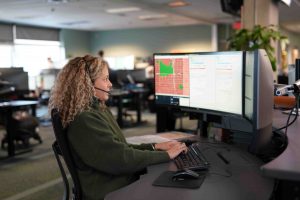Vancouver, B.C.–With nearly three-quarters of 9-1-1 calls in B.C. originating from cellphones, E-Comm says knowing your location is now more important than ever. Of the more than 1.13 million 9-1-1 calls the emergency communications centre has received so far in 2019, 74% originated from a cellphone–a 10% increase over five years. With more people using mobiles only and social media geotagging and delivery apps that show location in real-time, E-Comm is concerned that there’s a potentially dangerous public misconception that cellphones provide an exact address or location to 9-1-1 call takers.
“While calls from landlines give us a person’s exact whereabouts, information from cellphones is nowhere as precise,” explains E-Comm’s Director of Public Safety Initiatives, Ryan Lawson. “Because location is determined by cell tower triangulation, it’s generally narrowed down to within a block of where someone is calling. That’s helpful, but it doesn’t eliminate the need for our staff to work with callers to find out exactly where they are so first responders can get to them as fast as possible.”
Lawson adds that new 9-1-1 technology, currently in development by cellphone carriers as part of a North American-wide initiative called Next Generation 9-1-1, will allow for future improvements.
“In the coming years, we’ll see calls delivered to 9-1-1 with more precise location and additional information about the caller, the device being used and the location from which it is calling. This means call takers will spend less time trying to determine where the emergency is taking place and dispatchers will be able to make better decisions on what resources to dispatch and where. Until then, ‘what is your location’ will always be the first question our staff ask.”
9-1-1 call taker Madison Sheane agrees. “When you call 9-1-1, my job is to get you the help you need as quickly as possible. You can help me do that faster by answering my questions, including knowing your building or home address, the streets or landmarks you are near and your compass directions. This allows me to narrow down precisely where you are and I can get that information to first responders who are already on their way to help you.”
Sheane adds that people are often surprised when she asks them for their address on a call. They assume 9-1-1 call takers already have this information, based on what they see portrayed on TV and in movies.
E-Comm surveyed its 9-1-1 staff to ask what they thought was the most critical piece of operational information callers need to understand and knowing your location was number one. As such, E-Comm has launched a public campaign highlighting this: https://bit.ly/2DHFsGE
E-Comm was the first 9-1-1 centre in Canada to begin receiving general location information from cellphone carriers when it first became available in 2009. The organization is now participating in the next phases of 9-1-1 evolution mandated by the CRTC.
-30-
Photo/Interview Opportunity
E-Comm invites the media to its Lower Mainland Emergency Communications Centre at 3301 East Pender Street on Monday, December 9 between 9:00 a.m. and 12:00 p.m. for interview opportunities with E-Comm Director of Public Safety Initiatives Ryan Lawson and 9-1-1 Call Taker Madison Sheane.
For interviews, you must confirm your attendance in advance by emailing [email protected].
Note: Government photo identification is required to enter the E-Comm building. Photos and video in the Emergency Communications Centre is permitted under specific conditions.
Additional Resources
Media contact:
Kaila Butler
Senior Communications Specialist



